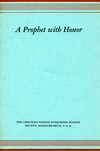

Are you sure?
This bookmark will be removed from all folders and any saved notes will be permanently removed.
Sunday School Notes and Comments
Remarks by Bliss Knapp at a Meeting of Sunday School Teachers of The Mother Church Sunday School
Mary Baker Eddy, the Leader of the Christian Science movement, is the topic assigned to me by our Superintendent. Mrs. Eddy's leadership is the most vital problem of today. She has claimed for herself three titles, namely, the Discoverer and Founder of Christian Science, and the Leader of the Christian Science movement. These titles have all been severely contested. Mrs. Eddy took the first case to the Federal District Court, and there won the right to be known as the Discoverer of Christian Science. Litigation developed in the year 1919 which involved her claim to be the Founder of Christian Science The Supreme Court of Massachusetts decided in her favor by sustaining the government of our Church Manual. There remains her title of Leader, and she represents the highest visible idea of God concerning leadership. The contest is still with us as to whether her own followers shall accept her leadership.
We can learn much more about such problems from practical experience than from theorizing. I recall how much I once learned along this line at a Christian Science lecture. The judge who introduced me was not a Christian Scientist. In presenting his introduction, he kept increasing the volume of his voice until he was fairly shouting at that small group of people. I thought at first his purpose was to overcome opposition in the audience. I soon learned the facts of the case when I began the lecture. In response to my every statement, there came back to me from the audience the mental argument that no one could understand what I saying. Such a mental argument was in direct contrast to what I had experienced the night before in a near-by town, for many of those present had remarked upon the clarity and simplicity of the lecture. I promptly concluded that the difficulty was not with the lecture.
A lecturer has to think of many things besides the delivery of his lecture, and it was my business to discover as promptly as I could what was producing that disturbing condition in the audience. Twice I succeeded in silencing the opposition, but each time it was momentary. That experience gave me my first real clue to the difficulty. Then I knew the opposition was not in the audience; if it had been, the silencing of it would have remained permanent. So I concluded the difficulty was not confined to the congregation; it must be a community problem.
Enjoy 1 free Sentinel article or audio program each month, including content from 1898 to today.
JSH Collections
This article is included in:
1939 - PAMPHLET
A prophet with honor
JSH-Online has hundreds of pamphlets, anthologies, and special editions for you to discover.

January 28, 1939 issue
View Issue-
"Could ye not watch with me one hour?"
MARION SUSAN CAMPBELL
-
"A wise and an understanding heart"
ALTON N. SWETT
-
Progress Is Joyous!
ALICE LOUISE MERRILL
-
"These things shall be added"
JOHN MURRAY BURRISS
-
Eternal Now
JANE W. MC KEE
-
"Songs of deliverance"
ALFREDA NOBLE
-
Buoys
FRANCES R. CORNER
-
A Daily Prayer
LUCY M. GOODENOUGH
-
Sunday School Notes and Comments
with contributions from Colette R. van der Zijl
-
The Open Door
Violet Ker Seymer
-
Controlling One's Thoughts
George Shaw Cook
-
Notices
with contributions from The Christian Science Board Of Directors
-
The Lectures
with contributions from Clara E. McKenzie, Donald R. Fox, Anna Petersen
-
Although we had studied Christian Science for several...
Isidora C. Joaquim
-
It is with sincere gratitude for the many blessings that...
Richard W. Wagner
-
I wish to testify to the uplifting, regeneration, and healing...
Martha M. Percival
-
Shortly after my coming into Christian Science I had a...
Eleanor Olds Torrey
-
With a heart full of joy and gratitude I wish to tell of...
Maria Pettersson
-
In March, 1937, I came home one evening to find our...
Henry A. Pfeiffer, Jr.
-
I have had many healings in Christian Science, both...
Winifred M. Woodrow
-
A specialist had told me that I should lose the sight of...
Blanche E. Benjamin
-
Love
GRACE M. FRANCK
-
Signs of the Times
with contributions from Lynn Landrum, J. C. DeVries, C. Fosberg Hughes, Wallace E. Brown, Hugh Redwood, A. H. West, Benjamin E. Watson


